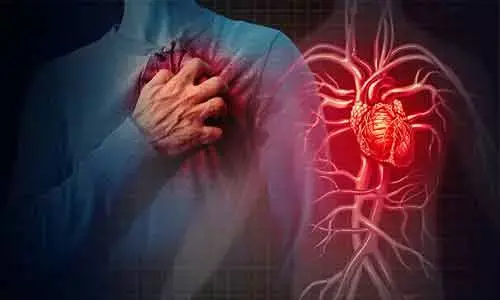- Home
- Medical news & Guidelines
- Anesthesiology
- Cardiology and CTVS
- Critical Care
- Dentistry
- Dermatology
- Diabetes and Endocrinology
- ENT
- Gastroenterology
- Medicine
- Nephrology
- Neurology
- Obstretics-Gynaecology
- Oncology
- Ophthalmology
- Orthopaedics
- Pediatrics-Neonatology
- Psychiatry
- Pulmonology
- Radiology
- Surgery
- Urology
- Laboratory Medicine
- Diet
- Nursing
- Paramedical
- Physiotherapy
- Health news
- Fact Check
- Bone Health Fact Check
- Brain Health Fact Check
- Cancer Related Fact Check
- Child Care Fact Check
- Dental and oral health fact check
- Diabetes and metabolic health fact check
- Diet and Nutrition Fact Check
- Eye and ENT Care Fact Check
- Fitness fact check
- Gut health fact check
- Heart health fact check
- Kidney health fact check
- Medical education fact check
- Men's health fact check
- Respiratory fact check
- Skin and hair care fact check
- Vaccine and Immunization fact check
- Women's health fact check
- AYUSH
- State News
- Andaman and Nicobar Islands
- Andhra Pradesh
- Arunachal Pradesh
- Assam
- Bihar
- Chandigarh
- Chattisgarh
- Dadra and Nagar Haveli
- Daman and Diu
- Delhi
- Goa
- Gujarat
- Haryana
- Himachal Pradesh
- Jammu & Kashmir
- Jharkhand
- Karnataka
- Kerala
- Ladakh
- Lakshadweep
- Madhya Pradesh
- Maharashtra
- Manipur
- Meghalaya
- Mizoram
- Nagaland
- Odisha
- Puducherry
- Punjab
- Rajasthan
- Sikkim
- Tamil Nadu
- Telangana
- Tripura
- Uttar Pradesh
- Uttrakhand
- West Bengal
- Medical Education
- Industry
New exosome spray could help repair heart after heart attack: Study

The spray is a promising strategy to deliver therapeutic exosomes for heart repair.
China: The researchers from China have developed a minimally invasive exosome spray that helped in repairing rat hearts after myocardial infarction (MI), according to a recent study in the journal ACS Nano.
Heart attack, or myocardial infarction, is one of the leading causes of death worldwide. Although modern surgical techniques, diagnostics, and medications have greatly improved early survival from these events, many patients struggle with the long-term effects of permanently damaged tissue, and the 5-year mortality rate remains high.
Scientists have explored using stem cell therapy as a way to regrow tissue after a heart attack. But introducing stem cells directly to the heart can be risky because they could trigger an immune response or grow uncontrollably, resulting in a tumor. Therefore, researchers have tried injecting exosomes -- membrane-bound sacs containing proteins, lipids and nucleic acids secreted by stem cells -- into the heart, but they often break down before they can have therapeutic effects. Others have developed cardiac patches, or scaffolds that help implanted exosomes last longer, but they usually must be placed on the heart during open-chest surgery. Yafeng Zhou and colleagues wanted to develop an exosome solution that could be sprayed onto the heart through a tiny incision, avoiding major surgery.
The researchers mixed exosomes from mesenchymal stem cells with fibrinogen, a protein involved in blood clotting. They added this solution to a tiny, double-barreled syringe that contained a separate solution of another clotting protein called thrombin. When the team sprayed the solutions out of the syringe onto a rat's heart through a small chest incision, the liquids mixed and formed an exosome-containing gel that stuck to the heart. A mini-endoscope, inserted through a second small incision, guided the spray needle. In rats that had recently had a heart attack, the exosome spray lasted longer, healed injuries better and boosted the expression of beneficial proteins more than heart-injected exosomes. In pigs, the spray caused less severe immune reactions and surgical stress than open-chest surgery. The spray is a promising strategy to deliver therapeutic exosomes for heart repair, the researchers say.
Reference;
The study titled, "A Minimally Invasive Exosome Spray Repairs Heart after Myocardial Infarction," is published in the journal ACS Nano.
DOI: https://pubs.acs.org/doi/10.1021/acsnano.1c00628
Hina Zahid Joined Medical Dialogue in 2017 with a passion to work as a Reporter. She coordinates with various national and international journals and association and covers all the stories related to Medical guidelines, Medical Journals, rare medical surgeries as well as all the updates in the medical field. Email: editorial@medicaldialogues.in. Contact no. 011-43720751
Dr Kamal Kant Kohli-MBBS, DTCD- a chest specialist with more than 30 years of practice and a flair for writing clinical articles, Dr Kamal Kant Kohli joined Medical Dialogues as a Chief Editor of Medical News. Besides writing articles, as an editor, he proofreads and verifies all the medical content published on Medical Dialogues including those coming from journals, studies,medical conferences,guidelines etc. Email: drkohli@medicaldialogues.in. Contact no. 011-43720751


